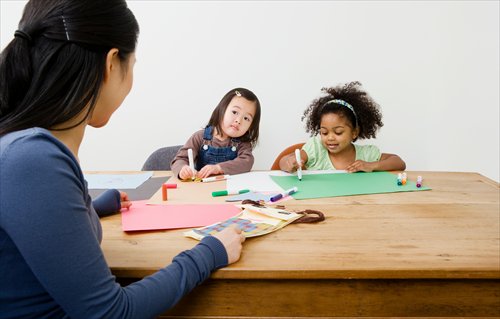HOME >> LIFE, METRO BEIJING
Kindergarten abroad
By Li Lin Source:Global Times Published: 2014-12-7 19:43:01
Chinese parents are turning to the West for short-term education

Experts are concerned parents are sending their kids abroad without researching whether overseas education will be the right choice in the long run. Photo: IC
"Today, I am a fireman!" shouted 4-year-old boy Zhang Jixuan, wearing a professional-looking miniature fireman's uniform. He and his classmates' task for that day was to put out a 'fire' made up of red paper on the lawn and to learn about fire safety.Many Chinese parents would deem Zhang's first five months in kindergarten "unusual" and "interesting" because his mother, Wang Feng, deliberately took him to the US to enroll in kindergarten instead of staying in their hometown of Beijing.
Wang arrived with her son in Pasadena, California in March, 2014 and sent him to a local Montessori kindergarten, hoping he would be able to better learn English if surrounded by native speakers. Wang also wanted her son to experience her preferred method of education at an early age. A US tourist visa allowed them to stay a maximum of six months, during which Zhang attended the private kindergarten for about $1,100 a month.
Wang's search for a perfect kindergarten for her son didn't begin overseas. As Zhang approached the age to enroll in school, Wang researched kindergartens in Beijing. However, she ended up finding Beijing schools were too expensive, and she doubted the quality of education they would provide Zhang.
"The kindergarten I was most satisfied with charged more than 5,000 yuan ($812.98) per month, and I heard several friends say the teachers there were, for the most part, not qualified," Wang said. "The tuition was almost the same as it was in the US, so I thought, why not take him there?"
Wang is just one of many parents in China who have already turned to overseas education options for their young children. In 2013, the number of children receiving kindergarten, preschool and primary education abroad composed one-fifth of the 413,900 Chinese students who studied abroad, according to a report published by the Chinese Academy of Social Sciences.
Feng Zengjun, a professor at Sun Yat-Sen University's School of Education, said in the Guangzhou Daily in November that it is understandable for parents to send their children overseas for kindergarten.
"One of the most important reasons for Chinese people's high ability of imitation and low ability of creativity lies in primary school education and kindergarten," Feng said."In Western countries, children play almost all day, but not blindly. There's a theme in the play, which helps children learn to make decisions and be creative. This is better than Chinese education, which focuses more on the children's performance and how much knowledge they can store up."
Feng said in the report he thinks it seems impossible that China would ever create an institution that matches US teaching styles in its primary education system.
But Chen Zhilin, a psychologist specializing in children's education and family issues, told Metropolitan he worries studying overseas at a young age is a trend parents are "blindly following" without assessing their children's needs and aspirations.
"Parents should find out as early as possible where the children's interests lie and what they want to learn," Chen said. "They should be clear about their child's future, such as whether they will stay overseas or in China in the long term."
"The Chinese traditional education system is actually the most suitable for Chinese children if there's no plan to move overseas. Parents should learn to appreciate the advantages of Chinese education," he added.
Some parents have even different criticisms for Wang's decision.
"I can not agree with taking a child on a short-term kindergarten trip overseas," Zhang Weiwei, a mother of a 5-year-old girl, said. "The child will need a long time to get used to life abroad, especially if their English is not good. When they finally get used to it, they have to leave, and the child may feel at a loss when back in China again."
Zhang also said that if a parent chooses public school over a private one, she fears the longterm effects of the US policy against admitting pupils on a tourist visa in public schools.
"I heard a mother took her child to the US on a tourist visa for public junior high school for just three months," Zhang said. "The school ended up accepting the child on the account that the US grants every child the right to education, but years later when the child wanted to apply for universities in the US, he was denied because the three-month experience was on his record."
Whatever the risks, Wang dubs herself "xenocentric", determined to seek out what she deems a flexible, creative environment for her child's growth.
During his last 20 days in the US, Wang even took her son on a trip around the country.
"International kindergarten in Beijing is an option, but what about outside kindergarten?" Wang said. "What we want is the entire foreign culture, including what we enjoyed during our travels abroad."
Posted in: Metro Beijing, Family